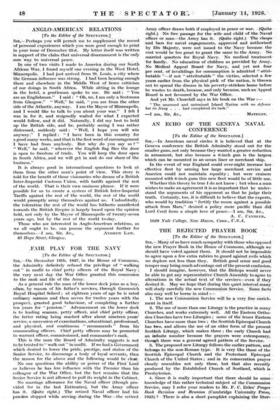.FAIR PLAY FOR THE NAVY
_
[To the Editor of the SPECTATOR.]
Sia,—On December 19th, 1927, in the House of -Commons, the Admiralty: definitely refused the privilege of ". walking
• out" in mufti to chief petty officers of the- Rciyal Navy; the very next day the War Office granted this concession
.to the rank and file of -the Army. • -: • -- - -
As a general rule the man of the lower deck joins as a boy, often, by reason of his father's services, through • Greenwich Royal Hospital-School ; at eighteen years of age he is rated ordinary seaman and then serves for twelve years With the prospect, -granted good behaviour, of completing a further ten -years for "pension." Advancement on the' '1Ower deck is to leading seaman, petty -officer, -and 'chief petty offieer, the latter rating, being reached after abont nineteen- years' service, a succession of examinations, educational, professional, and physical, and continuous " recommends " from his' commanding officers. Chief petty officers May be promoted' to warrant officer, commissioned, and commander's rank.
This is the man the 13oard of Admiralty suggests is not to be trusted to " walk out 'in mufti : , If we had a GO'verruinent which desired to lower the pride, prestige, and status of the Senior Service, to discourage a body of loyal servants, then the reason for the above and the following would be clear.
No one questions the ability or 'power of the First- LODI or .believes he has less influence with the Premier 'than his colleague of. the War Office, but the fact remains that the Senior SerOde is not allowed to pull its *eight in the 'Cabinet.
No marriage allowanee for the Naval -.officer (though pro- vided for in the last Estimates), but the Army 'officer has , it. (Quite right.) The retired Naval _officer hid his penSiOn stopped while serving, during the War--the ;retired Army officer draws both if employed-in peace or war. .. (Quite .
• right.) --No- free passage -for the wife: and -child- of the Naval 'officer, or man—the Ariny :his it:: (Quite .right.) The clasps- • :and. hark for. -naval engagements; approved and authorized
• by His- Majesty, were not issued to the_ Navy because .the cost would be too great to grant the same to .the Army. N. . married quarters for Royal Navy. No Medical treatment, . for fainily. 'education- of Children as provided by Army. No Medical Appeal Board for Navy, and yet not four per cent, of, invalidings for consumption is admitted attri- butable "—if not " attributable " the. victim,- selected, a few years earlier from the physical pick of the nation, is thrown out tO -spread the disease in his poverty-stricken; home-before he wastes to death, beeause, and only becalise,-slich anAppeal Board is not favoured by .the War Office. -
And yet Mr. Churchill says in his book on the War :— "The unarmed and untrained Island Nation with no defence' but its Navy . . . had completed its task."


































 Previous page
Previous page